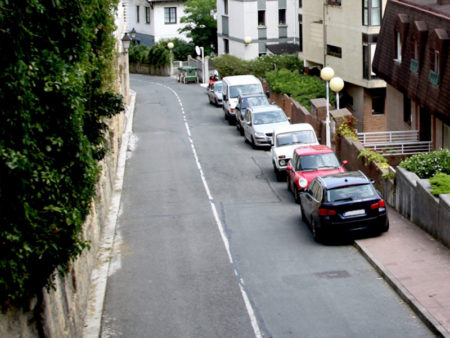Government to explore pavement parking ban
Long-awaited proposals to crack down on pavement parking are being set out by the Department for Transport, with a consultation due this summer.

A 12-week consultation this summer will look at options, including how a national pavement parking ban could work
Pavement parking has already been banned by default in London for more than 40 years, and is currently in the process of being outlawed in Scotland but is still generally allowed in England.
Yet, a Department for Transport pavement parking review initially expected in 2015 and carried out in 2019 found that pavement parking was problematic for 95% of respondents who are visually impaired and 98% of wheelchair users
Now – following a report from the Transport Select Committee six months ago calling for an outright ban – the Government has said a 12-week consultation this summer will look at options including how a national pavement parking ban could work, taking into account necessary exceptions and extended enforcement powers for local authorities; at the moment, outside of London, only the police have the power to enforce pavement parking bans.
The consultation would also explore the need for any necessary exceptions or designated spots for pavement parking where needed, and how a tailored approach may be required in rural and suburban areas, which face very different challenges.
Transport Secretary Grant Shapps said: “Vehicles parked on the pavement can cause very real difficulties for many pedestrians.
“That’s why I am taking action to make pavements safer and I will be launching a consultation to find a long-term solution for this complex issue.
“We welcome the Transport Select Committee’s recent report and share their drive to tackle pavement parking and improve people’s daily lives.”
It’s a move popular with those campaigning on behalf of the vulnerable pedestrians.
Stephen Edwards, director of policy and communications at Living Streets, said: “Pavement parking forces people with wheelchairs, buggies and those living with sight loss into the road and into oncoming traffic and the most vulnerable pedestrians continue to be put at risk of injury and isolation every day that this dangerous act continues.”
The RAC also said there was a need for action. Head of roads policy Nicholas Lyes said: “Nobody should be forced into stepping into the road to get around a vehicle that has taken up pavement space, so the Government is right to explore giving local authorities additional powers to enforce this types of selfish parking.
“However, outlawing pavement parking as a whole is more complex because not all streets in the UK are the same. For example, some drivers will put a tyre up the kerb on a narrow residential street to avoid restricting road access to other vehicles while still allowing plenty of space for pedestrian access. Therefore better guidance and a definition of what is and isn’t appropriate would be a more practical solution, rather than an outright ban.”
And a survey carried out two years ago found the majority (55%) of British drivers are against a ban.
The Department for Transport is also looking at possible options to streamline and digitise the process used to create restrictions such as temporary road closures for roadworks, special events or permanent changes to speed limits and parking restrictions, known as ‘Traffic Regulation Orders’.












